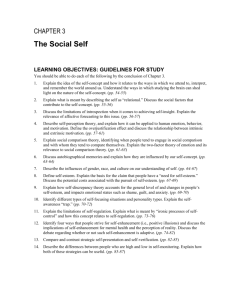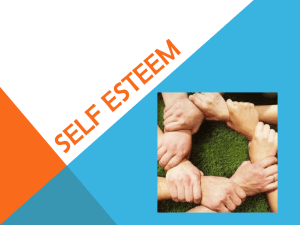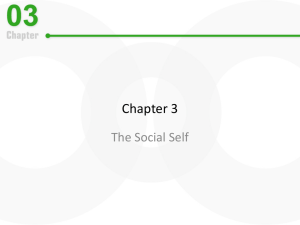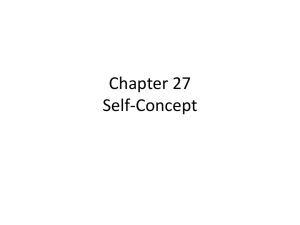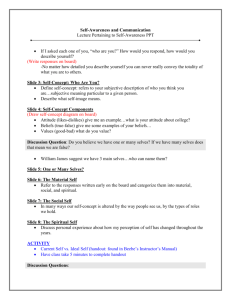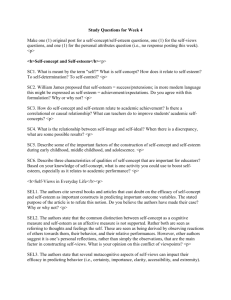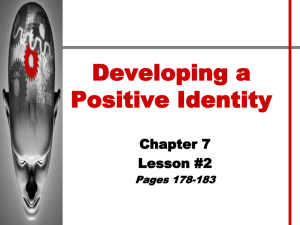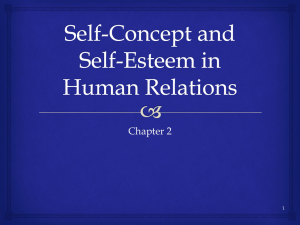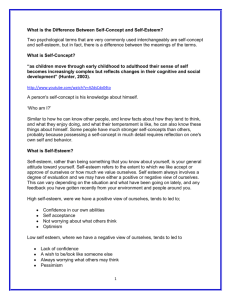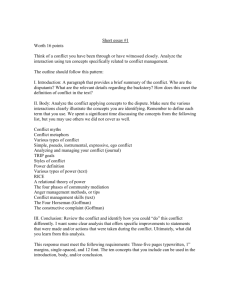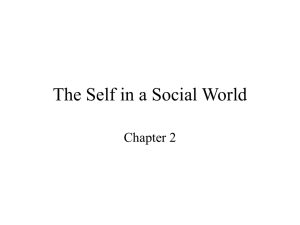Self-concept
advertisement
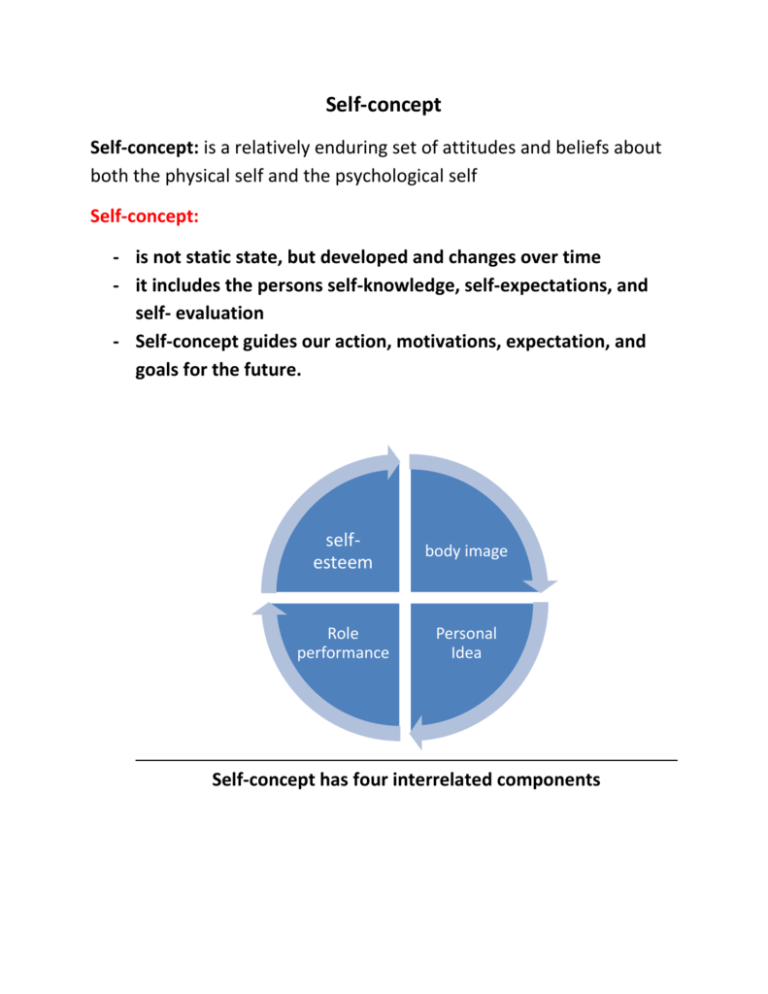
Self-concept Self-concept: is a relatively enduring set of attitudes and beliefs about both the physical self and the psychological self Self-concept: - is not static state, but developed and changes over time - it includes the persons self-knowledge, self-expectations, and self- evaluation - Self-concept guides our action, motivations, expectation, and goals for the future. selfesteem body image Role performance Personal Idea Self-concept has four interrelated components Components of self-concept 1- Self-esteem: defined as the degree to which a person has a positive evaluation of self-based on her perceptions of how she is viewed by others as well as on her view of herself There are two schools of thought about development of self-esteem First: self-esteem forms early in life, based primarily on relationships with early caregivers (mothers &family) Second: self-esteem fluctuates تغلبwhenever life transition, crises, or illness challenges. التغييرات التي تحصل بحياة االنسان Theories for personality development and self-esteem: 1- Maslow s Hierarchy of needs 2- Erikson s eight staged of man. Self-actualization needs Maslow Erikson Esteem needs Love and Belonging needs Safety needs Physiological needs Trust Autonomy Initiative industry identity intimacy generativity integrity Erikson’s described the development of self-esteem in eight stages, ranging from infancy through old age According to Erikson’s: Trust: through the concern of caregivers From (1-3 years) Autonomy: through learning control of the body Initiative & Industry: child gradually developed broader control over the time. Identity: At adolescent Intimacy, generativisty, and integrity: occur in adulthood. 2-personal identity: is the organizing principle of the personality that accounts for unity, continuity, consistency, and uniqueness of a person Components of personal identity : - Emotional image: are feeling about oneself - Cognitive image: are derived from thinking about oneself - Perceptual image: are derived from external sensory data and translated into mental pictures of reality 3-Role performance: includes the roles a person assumes or is given Its includes the actions, thoughts, and feelings associated with those roles. Roles are defined in terms of relationship to others (Ex. mother, father, supervisor, teacher, and nurse are all roles 4-Body Image: is a person’s perception of her body Factors Affecting Self-concept A- Developmental factors 1- Infant to preschoolers: self-esteem in infant and preschoolers can be related to the type of parenting the child receives 2- School-aged children: the child is a threat to self-esteem when the child attempts to master the tasks of school 3- Adolescents: Ages 12-20 years, is a period of sweeping hormonal changes and rapid physiological growth. It’s a very stressful period of major life transition that can threaten selfesteem. 4- Young Adults: ages 20-30 years, is a time of decision making about becoming independent. 5- Middle Adults: the task is one of caring for others (elder parents) or guiding the young ( children or grandchildren). Multiple stressors and the beginning of physical decline has a potential to alter the self-concept during this period of life. 6- Older Adults: many elderly people must cope with several chronic illness, learning to live with a chronic illness can lead to depression B- Cultural and Religious factors: may contribute to a client’s selfesteem. C- Socioeconomic Factors: has a direct relationship to self-concept ( health care practices, lifestyle, living condition) D- Psychological Factors: (Depression, stress, loss, violent or abusive relationships) E- Physiological factors: ( fatigue, trauma, chronic illness, surgery, Disability, obesity) Self- Concept Nursing Diagnosis Problems of Self-esteem 1 Self –esteem disturbance 2 Chronic low self-esteem 3 Situational low self-esteem 4 Body image disturbance 5 Altered role performance description Negative self-evaluation/ feelings about self or self-capability Self-Long – standing negative selfevaluation about or self-capability Negative self-evaluation(developed in response to a loss an individual who previously has a positive self-evaluation Disruption in the way one perceives one’s body image Disruption in the way one perceives ones role performance Characteristics of people with high self-esteem versus low self-esteem 1 2 people with high self-esteem Accept responsibility 1 2 5 Expect to be valued and accepted by others Have positive perception of their skills Perform equally well when being observed as when not watched Accept criticism 6 7 Can accept compliments easily Evaluate their performance realistically 6 7 Relatively confortable relating to authority figures 9 Express general satisfaction with life 10 Have a social support system that gives positive feedback and encouragement 8 3 4 8 3 4 5 people with low self-esteem Blame others for their lack of sense of wellbeing Expect people to be critical of them and avoid their company Have negative perceptions of their skills Perform less well when being observed Are defensive and passive in person to criticism Have difficulty a accepting compliments Have unrealistic expectation about their performance Are uncomfortable relating authority figures 9 Are dissatisfied with their lot in life 10 Have a weak social support Data cluster 15- years female with scoliosis needs to wear a brace to slow the progression of the scoliotic curve and refuses to do so 24-years old mother of 2 – day old infant verbalized inadequacy of her new role, stating “my husband and I already don’t have time together 40- years old female was diagnosed with multiple sclerosis over a year ago. She has made a poor adjustment to her illness, she states, “I’m so tired of having to depend someone else to do things for me”. I wish I could die 32- Years old divorced male with custody of 3-year old child. His ex-wife is in a drug rehabilitation program in another state. States that he does not know what to do with the child. I have to work all day and do not have the skills to care for a child; I couldn’t make my marriage work. How can I raise a child? Diagnosis
